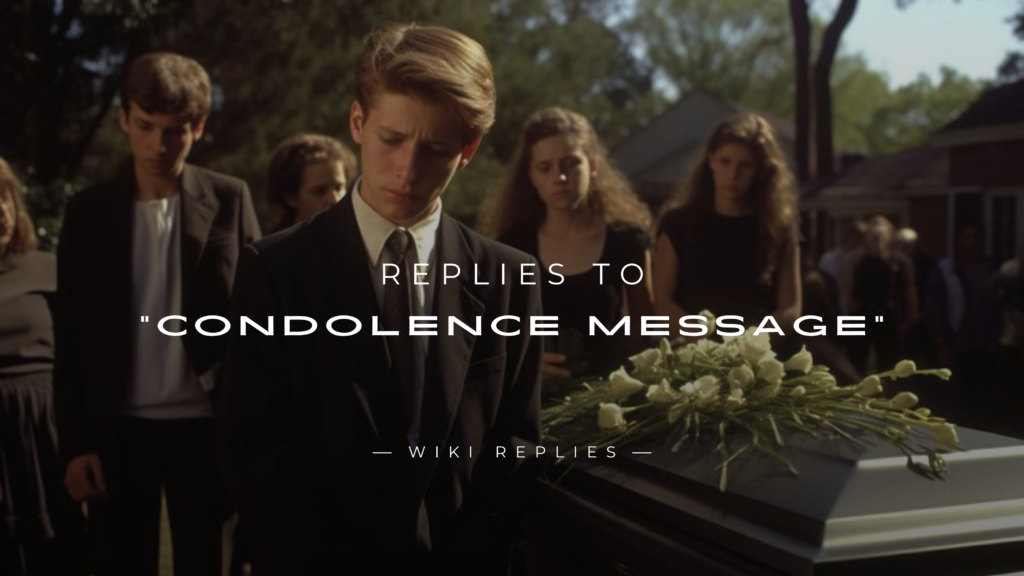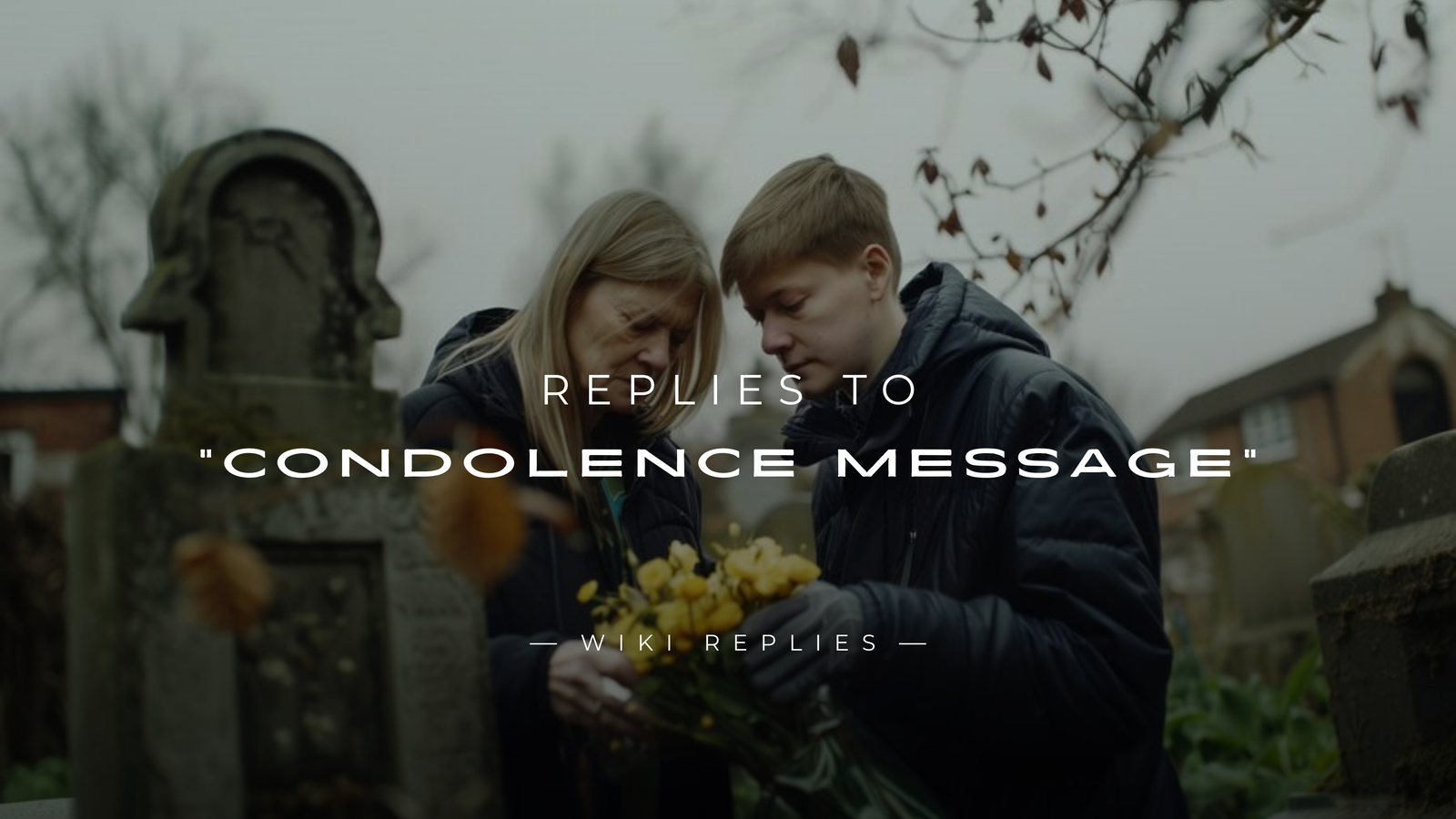Dealing with loss is never easy, and receiving a condolence message can be a bittersweet experience. On the one hand, it brings comfort knowing others are thinking of you during such a difficult time. On the other, responding to those messages can feel overwhelming, especially when you’re deep in grief. But, responding to these messages is an important part of processing your emotions and maintaining the connections that can support you through this challenging time.
In this article, we’ll guide you through the thoughtful ways to respond to condolence messages, whether they come from family, friends, colleagues, or even acquaintances. From acknowledging the support to expressing your gratitude, we’ll cover everything you need to know to craft a sincere and heartfelt reply.

220+ Replies to “Condolence Message”
Simple Acknowledgment
- Thank you for your kind words. It means a lot to me.
- I really appreciate your condolences. Thank you.
- Thanks so much for your support during this time.
- I’m grateful for your message and your thoughts.
- Thank you, your words bring me comfort.
- I appreciate you reaching out, it means a great deal.
- Your message is deeply appreciated, thank you.
- Thank you for keeping me in your thoughts.
- It’s comforting to hear from you. Thank you.
- I’m so grateful for your kind words. Thank you.
Grateful & Appreciative
- Your message brought me so much comfort. Thank you for your support.
- I truly appreciate your kindness during such a difficult time. It means more than I can express.
- Thank you for being there for me. Your words of support help me through this tough time.
- Your sympathy is so appreciated. I’m thankful for your thoughts and prayers.
- I can’t express how much your words mean right now. Thank you so much for thinking of me.
- Your message touched my heart. I’m so grateful for your compassion.
- Thank you for your heartfelt condolences. Your support means the world to me.
- I’m deeply grateful for your kind words. They’ve brought a sense of peace.
- Your kindness during this challenging time means more to me than you know. Thank you.
- Thank you for your thoughtfulness. It’s comforting to feel supported by friends like you.
Emotionally Expressive
- This has been the hardest time for me, and your kind message really helped ease the pain. Thank you.
- I’ve been struggling with this loss, but your words brought a sense of calm to my heart. Thank you so much.
- I can’t even begin to describe how much your message has meant to me. It’s comforting to know I’m not alone.
- This grief is overwhelming, but your words have given me strength. Thank you for being there for me.
- I feel so much pain right now, but knowing that you’re thinking of me is such a relief. Thank you from the bottom of my heart.
- It’s been really tough, and your message was just what I needed to hear. I’m truly thankful for your support.
- Every word you shared brought tears to my eyes. Your support during this heartbreaking time means the world to me.
- I feel such a deep sense of loss, but knowing that you care is helping me get through each day. Thank you.
- Your words gave me the strength to face another day of grief. I can’t thank you enough.
- In the midst of all this sorrow, your kindness gave me a little peace. I’m so grateful for your message.
Religious/Faith-Based
- Thank you for your prayers. I truly believe they’re helping me through this difficult time.
- Your kind words and prayers are a great comfort to me. I know [Deceased’s Name] is in a better place now.
- May God bless you for your thoughtfulness. Your support means more than you know.
- Thank you for keeping me in your prayers. I know that God’s grace will help me find peace.
- Your message reminds me of the strength of my faith. Thank you for your comforting words.
- I feel truly blessed to have your prayers and kind thoughts during this time. Thank you.
- Thank you for your spiritual support. I know that with faith, healing will come in time.
- Your prayers have brought me peace. I trust that God has a plan for all of us.
- Thank you for your kind words. I feel uplifted by your faith and your prayers for our family.
- Your message is a reminder that we’re never alone in our grief. I am so grateful for your spiritual support.
Personalized Response
- Thank you so much for your message. I know how much [Deceased’s Name] valued your friendship, and it means a lot to me to hear from you.
- Your words truly touched me. [Deceased’s Name] would have appreciated hearing from you, as I do now.
- I’m so grateful for your kind words. You and [Deceased’s Name] shared so many great memories together.
- Your message was a beautiful reminder of the bond you had with [Deceased’s Name]. I’m so thankful for your support.
- Thank you for thinking of me during this time. [Deceased’s Name] always spoke highly of you, and your message is a comfort.
- Your words brought back wonderful memories of [Deceased’s Name]. I’m so glad to hear from you.
- Thank you for sharing your memories of [Deceased’s Name]. It means a lot to me to know they were so appreciated.
- I truly appreciate your kind thoughts. [Deceased’s Name] always held you in high regard, and I know they would be grateful for your support.
- Your words made me smile, thinking of the good times you had together. Thank you for being there for me.
- Thank you for your comforting message. It means the world to me to know that [Deceased’s Name] was loved and cherished by people like you.
Acknowledging Close Relationships
- I can’t thank you enough for your message. Knowing how much you meant to [Deceased’s Name] makes this even more comforting.
- Your message really touched me. I know [Deceased’s Name] would be so glad to know you’re thinking of them and of me.
- Thank you for reaching out. It helps to know that you’re here for me, especially during this time of loss.
- Your kindness means so much to me. I know [Deceased’s Name] loved you dearly, and your words are such a comfort.
- I appreciate you thinking of me during this difficult time. Your love and support mean the world to me.
- It’s hard to put into words how grateful I am for your support. [Deceased’s Name] would have appreciated you being here for me.
- Thank you for your message. Your support makes me feel like I’m not going through this alone.
- I’m so grateful to have you by my side. Your message is a reminder of the close bond we all shared.
- Your kind words are a reminder of how important relationships are. Thank you for being there for me.
- It means so much to me that you’re thinking of me during this time. I’m thankful to have you in my life.
Offering a Follow-Up or Continued Connection
- Thank you for your message. It would be great to talk soon when you have the time—I’d love to catch up.
- I truly appreciate your kindness. Let’s get together soon; I’d love to share some memories of [Deceased’s Name] with you.
- Your support means a lot to me. When you’re free, it would be nice to connect and talk.
- Thank you for reaching out. If you’re up for it, I’d love to sit down and talk about [Deceased’s Name] whenever you’re available.
- I appreciate your thoughtfulness. Let’s keep in touch. It would be great to talk more soon.
- Your message means so much. When things calm down, let’s get together—I’d love to catch up and share stories.
- I’m so grateful for your support. If you’re up for it, let’s chat soon. I would enjoy the comfort of your company.
- Thanks for your kind words. Let’s talk soon—I’d love to spend time together and reflect on happy memories.
- I appreciate you thinking of me. I’d love to reconnect when you have time; it would be nice to talk more.
- Thank you for your kind message. Let’s catch up soon—it would be great to talk more and share memories of [Deceased’s Name].
Professional or Formal Response
- Thank you for your kind words during this difficult time. Your support is greatly appreciated.
- I appreciate your condolences. It is comforting to receive such thoughtful messages during this time.
- Thank you for reaching out. Your sympathy and support are truly appreciated.
- Your kind message means a lot to me. Thank you for your condolences.
- Thank you for your thoughtful words. Your support provides great comfort to me and my family.
- I am grateful for your message during this difficult time. Your sympathy is deeply appreciated.
- Thank you for your kind expression of sympathy. It provides great comfort to know others are thinking of me.
- Your condolences are sincerely appreciated. Thank you for your support and kindness.
- I appreciate your kind words during this time of loss. Your support means a great deal.
- Thank you for your thoughtful message. It is comforting to know you are keeping me in your thoughts.
Acknowledging Group Support
- Thank you to everyone for your kind words and support during this difficult time. Your collective compassion is truly appreciated.
- I am deeply grateful for the collective support of everyone. Your kindness has been a great comfort to me.
- On behalf of my family, I want to thank everyone for your condolences. Your collective support is helping us through this difficult time.
- Thank you to all for your comforting words and support. It means a lot to us during this time of grief.
- We appreciate the outpouring of sympathy and support from everyone. Your collective kindness is truly a blessing.
- I am so thankful for the support and kindness of everyone during this challenging time. Your thoughts and prayers are deeply appreciated.
- Thank you all for your heartfelt condolences. The strength of your collective support is a great comfort to us.
- I want to thank everyone for their compassion and support. It has helped us navigate through this painful time.
- Your collective kindness and support have been a source of comfort to my family and me. Thank you so much.
- Thank you all for your heartfelt messages and support. It has meant the world to us during this time of loss.
Acknowledging Physical or Practical Support
- Thank you so much for your kind help during this time. Your support in practical ways has meant the world to me.
- I truly appreciate your thoughtful gesture and the help you’ve offered during this difficult time.
- Thank you for your practical support. It’s been a huge comfort to me and my family.
- Your help with [specific task] was incredibly thoughtful. I can’t thank you enough for your support.
- I’m so grateful for the practical support you’ve provided. Your kindness has truly made a difference.
- Your willingness to help with [specific task] during this challenging time has been a great relief. Thank you.
- I appreciate your physical support and the way you’ve helped ease some of the burdens I’m facing right now.
- Your thoughtful gesture of helping with [specific task] has been such a comfort. Thank you for being there.
- Thank you for your kindness in offering practical support during this difficult time. It’s truly appreciated.
- I’m so thankful for your help with [specific task]. It has lifted a heavy load during this challenging time.
Keeping It Brief and Reserved
- Thank you for your condolences.
- I appreciate your kind words during this difficult time.
- Thank you for thinking of me.
- I’m grateful for your support and sympathy.
- Thank you for reaching out. Your words mean a lot.
- I appreciate your message. Thank you.
- Your condolences are deeply appreciated. Thank you.
- Thank you for your kind thoughts.
- Your message is greatly appreciated. Thank you.
- Thank you for your kind words of sympathy.
Expressing the Challenge of Grief
- This has been such a difficult time, and your message truly helped lift my spirits. Thank you.
- I’ve been struggling with the weight of this loss, and your kind words have been a real comfort to me.
- Grief has been overwhelming, but your message has brought me a bit of peace. Thank you.
- It’s hard to put into words how much I’m grieving right now, but your support means so much.
- The pain of this loss is hard to bear, but knowing I have your support helps me through.
- Grief is such a heavy burden, but your kindness is helping me carry it. Thank you so much.
- This loss has been incredibly difficult, but your comforting words have been a great source of solace.
- I’m finding it hard to process everything, but your support makes the journey a little easier. Thank you.
- Grief is overwhelming, but your message reminds me that I’m not alone in this. Thank you.
- The pain of this loss feels endless, but your support gives me strength to keep going. Thank you for being there.
Honoring the Memory of the Deceased
- Thank you for your kind words. [Deceased’s Name] will always be remembered with love and affection.
- Your message is a beautiful reminder of how loved [Deceased’s Name] was. Thank you for honoring their memory.
- I appreciate your kind words. [Deceased’s Name] will forever remain in our hearts.
- Thank you for remembering [Deceased’s Name] in such a meaningful way. Your support honors their memory.
- It’s comforting to know that [Deceased’s Name] is in your thoughts. Thank you for remembering them so fondly.
- Thank you for your message. [Deceased’s Name]’s memory will live on in all the lives they touched.
- Your words of remembrance are so comforting. [Deceased’s Name] will never be forgotten.
- Thank you for honoring [Deceased’s Name]’s memory. Their legacy will continue through the love and support of friends like you.
- I’m so grateful for your kind message. [Deceased’s Name] will always hold a special place in our hearts.
- Your support and remembrance of [Deceased’s Name] mean a great deal to me. Thank you for helping keep their memory alive.
Encouraging Shared Memories
- Thank you for your kind words. I’d love to hear any memories you have of [Deceased’s Name] when you have time.
- Your message was so comforting. If you have any stories of [Deceased’s Name] to share, I’d love to hear them.
- It’s comforting to hear from you. I’d love to reminisce about the good times with [Deceased’s Name] whenever you’re ready.
- Thank you for your support. Please share any memories you have of [Deceased’s Name]—I’d love to hear them.
- Your message brought back wonderful memories. If you’d like to share more, I’d love to listen.
- I appreciate your kindness. If you have any stories or memories of [Deceased’s Name], I’d love to hear them.
- Thank you for reaching out. If you feel up to it, I’d love to hear more memories of [Deceased’s Name] from you.
- Your words mean a lot. If you have any memories of [Deceased’s Name], I’d cherish hearing them.
- It’s comforting to hear your memories of [Deceased’s Name]. I’d love to share more when we’re able.
- Thank you for your message. If you’d like to share any fond memories of [Deceased’s Name], I would love to listen.
Expressing Hope for the Future
- Thank you for your kind words. I’m hopeful that in time, healing will come, and your support will be a big part of that.
- This is a difficult time, but I’m finding strength in your support and the hope that time will bring peace.
- Your message helps remind me that there is hope for healing ahead. Thank you for your encouragement.
- Though the pain is heavy now, your words remind me that with time, healing is possible. Thank you.
- I appreciate your support. I’m hopeful that with each passing day, it will become a little easier to bear.
- Thank you for your kind words. They give me hope that the pain of this loss will lessen with time.
- Your message brings comfort and a sense of hope for the future. Thank you for your support.
- Although it’s a tough time, your encouragement gives me hope that healing is on the horizon.
- Thank you for your kindness. It’s reassuring to know that, with time, the grief will soften, and I will find peace.
- Your words remind me that hope for the future is important, and I’m grateful for your support as I move forward.
Acknowledging a Distant Relationship
- Thank you for reaching out. Although we haven’t been in touch much, your message is deeply appreciated during this time.
- I appreciate you thinking of me, even though we haven’t seen each other in a while. Your kind words mean a lot.
- Thank you for your condolences. It’s been a long time, but it’s comforting to know that you’re thinking of me.
- Even though we’ve lost touch, your message is a reminder of the connections that matter. I truly appreciate your sympathy.
- It’s been a while since we last spoke, but your kind words have touched me. Thank you for thinking of me.
- Thank you for reaching out during this time. It means a lot that you remembered me despite the distance between us.
- I appreciate your condolences, especially considering the time that’s passed. Your message has truly warmed my heart.
- Your kindness during this time, even after such a long period of no contact, is something I’ll never forget. Thank you.
- Thank you for your message. Even though we don’t talk often, your support means a great deal to me right now.
- It’s been some time, but your message really touched me. I appreciate your condolences and support.
Humorous Yet Respectful Response
- Thank you for your kind words. I’m sure [Deceased’s Name] is laughing at how many of us are trying to navigate this without them!
- Your message brought a smile to my face. I’m sure [Deceased’s Name] would’ve had a good laugh at the chaos we’re all going through right now!
- Thank you for your condolences. I can already hear [Deceased’s Name] cracking jokes about how we’re all handling this.
- Your kind message really helped lighten the mood. I’m sure [Deceased’s Name] would have appreciated the humor in all of this.
- Thanks so much for your support. I’m sure [Deceased’s Name] is somewhere shaking their head at all of us, but probably laughing too.
- I really appreciate your kind words. Knowing that [Deceased’s Name] is still making us laugh in spirit is somehow comforting.
- Thank you for your message. I’m sure [Deceased’s Name] would have cracked a joke about how we’re all trying to get through this.
- Your words gave me a bit of a chuckle. I bet [Deceased’s Name] is looking down, wondering how we’re managing without their sarcasm!
- Thank you for your condolences. I’m sure [Deceased’s Name] would have found some humor in all of this madness!
- Your message was a bright spot in a tough time. I can hear [Deceased’s Name] laughing and shaking their head at us all.
Cultural or Tradition-Based Response
- Thank you for your condolences. Your words are a comforting reminder of the traditions that help us through such difficult times.
- I appreciate your message and the tradition of offering support during this time. It truly helps to feel connected to my heritage.
- Your kind words reflect the strength of our shared culture. I’m grateful for the support and comfort they bring during this time of loss.
- Thank you for your condolences. The traditions that bind us together offer a sense of peace in these moments of grief.
- Your message means so much to me, especially as we honor the customs that help guide us through times of sorrow.
- Thank you for your support during this time. Our cultural traditions have a way of bringing comfort and strength, and your message is part of that.
- I’m grateful for your condolences and the comfort that comes from knowing our traditions help us heal together.
- Thank you for remembering me during this time. It’s the cultural rituals and the kindness of others that help us find peace in grief.
- Your message truly comforts me, as our traditions are a powerful source of solace during such a difficult time.
- I appreciate your kind words. In honoring the traditions of my culture, your support feels even more meaningful.
Acknowledging a Condolence Gift or Gesture
- Thank you for the thoughtful [gift/gesture]. Your kindness has truly made this difficult time a little easier to bear.
- I am so grateful for your thoughtful [gift/gesture]. It was a beautiful and much-needed expression of support.
- Thank you for the [gift/gesture]. Your generosity during this time has been a great comfort to me and my family.
- I appreciate the thoughtful [gift/gesture] you sent. It’s a kind reminder that I’m not alone in this.
- Thank you so much for the [gift/gesture]. It truly brought comfort during this challenging time.
- Your [gift/gesture] is greatly appreciated. It has helped bring a bit of light during this difficult time.
- I can’t thank you enough for your thoughtful [gift/gesture]. It has provided much-needed support and comfort.
- Your [gift/gesture] was a beautiful and thoughtful reminder of your care and sympathy. Thank you.
- I’m so grateful for the [gift/gesture] you gave. It’s a reminder that your support is with me in a tangible way.
- Thank you for your kind [gift/gesture]. It was such a thoughtful and heartfelt gesture that truly helped lift my spirits.
Expressing Strength in Unity
- Thank you for your support. Together, we’ll get through this challenging time stronger than ever.
- Your message reminds me how important it is to lean on one another. Together, we will navigate this grief.
- I am so grateful for your support. Our strength lies in unity, and your presence makes all the difference.
- Thank you for being there for me. It’s through the strength of friends and family that I know we will get through this.
- Your support gives me strength. Together, we can honor [Deceased’s Name]’s memory and keep moving forward.
- Thank you for your kind words. It’s comforting to know that we’re not facing this alone and can rely on each other.
- Your support means the world to me. In unity, we’ll find the strength to get through this difficult time.
- I appreciate your message. Knowing that we are all in this together gives me strength and comfort.
- Thank you for your condolences. It’s amazing how much strength we can find when we come together.
- Together, we will honor [Deceased’s Name] and find the strength to heal. Thank you for your support.
Acknowledging a Colleague’s Condolences
- Thank you for your kind words and support during this time. Your thoughtfulness is truly appreciated.
- I’m grateful for your condolences. It’s comforting to know that my colleagues are thinking of me during this difficult time.
- Thank you for your message. Your support, both personally and professionally, means so much during this time.
- I appreciate your kind words. It’s a blessing to have such supportive colleagues who are here for me during this loss.
- Thank you for your condolences. Your support at work and beyond is truly comforting during this time.
- I’m so grateful for your kind message. Your support during this time is a reminder of how wonderful my colleagues are.
- Thank you for your thoughtful words. It’s comforting to feel the support of my colleagues during this tough time.
- Your kind message means so much to me. Thank you for reaching out and offering your support during this time.
- I truly appreciate your condolences. The support of my colleagues, like you, helps me get through this challenging time.
- Thank you for your kind words and support. It’s comforting to know that my colleagues are keeping me in their thoughts.
Expressing Gratitude for Presence at a Funeral/Service
- Thank you so much for being there for me during the funeral. Your presence was a great comfort during this time.
- I truly appreciate you attending the service. Your presence meant the world to me and my family.
- Thank you for being there during the service. Your support and presence helped make this difficult day a little easier.
- I’m so grateful for your presence at the funeral. It was such a comfort to have you there with me during this time.
- Thank you for coming to the service and showing your support. Your presence meant so much to me and my family.
- Your presence at the funeral was deeply appreciated. Thank you for being there for me during such a tough time.
- Thank you for attending the service. Your presence was a true comfort, and I’m so grateful you were there.
- I can’t thank you enough for being there with me during the service. Your support was invaluable during such a difficult time.
- Thank you for attending the funeral. It was a great comfort to have you there, and I’m grateful for your support.
- I’m so thankful you could be there at the service. Your presence and support helped ease the pain during this difficult time.
Why Responding to a Condolence Message is Important
Before we dive into the “how,” let’s first look at the “why.” Responding to a condolence message is an important way to acknowledge the support and love people are offering during your time of loss. It lets others know you appreciate their kind words and reminds you that you are not alone. Whether it’s a simple thank-you or a more detailed response, it helps maintain the bond you share with others and can even be a small step toward healing.
Understanding Condolence Messages
- What is a Condolence Message?
A condolence message is a message of sympathy or support sent to someone who has experienced a loss. It’s a way for people to express their sorrow and offer comfort, whether in person, over the phone, or through written words. These messages can come in various forms, such as handwritten notes, emails, or even text messages.
- The Purpose Behind Condolence Messages
The purpose of a condolence message is to show empathy and let the grieving person know they are not alone. These messages offer a sense of solidarity and hope, reminding the person that others are sharing in their sorrow and sending their best wishes for strength and peace.
- Different Types of Condolence Messages
Not all condolence messages are created equal. Some might be brief and to the point, while others might be more personal or elaborate. The tone can range from formal to informal, and the way you respond will often depend on your relationship with the person who sent the message.
When Should You Respond to a Condolence Message?
- Timing of Response
There’s no “right” time to respond to a condolence message, but it’s generally a good idea to acknowledge the message within a reasonable timeframe. If you feel up to it, replying within a few days is ideal. However, don’t stress if you need more time. Grief is personal, and sometimes it takes a while to process emotions before you can respond meaningfully.
- Is It Necessary to Respond Right Away?
It’s absolutely okay not to respond immediately. Grieving takes time, and there’s no rush. It’s important to take care of yourself first, and responding to condolence messages should happen when you feel ready. Everyone understands that grief doesn’t follow a set schedule.
- Handling Responses During Grief
When you’re grieving, your emotional state can fluctuate, and sometimes you might not feel like responding at all. That’s perfectly fine. If you’re not ready to respond, simply take a moment to breathe, and don’t feel pressured by anyone. You can always send a message of appreciation when you feel more emotionally equipped.
Ways to Respond to a Condolence Message
- Simple Thank You Responses
One of the simplest and most heartfelt ways to respond to a condolence message is by offering a genuine “thank you.” It’s a way to acknowledge the person’s kindness without needing to say much else. For example, “Thank you for your kind words during this difficult time. Your support means a lot.”
- Personalizing Your Reply
If you feel comfortable, consider personalizing your response. Mentioning the deceased person’s name, sharing a fond memory, or simply telling the sender how their message touched you can make your reply more meaningful.
- Responding to Messages of Support
Some condolence messages may offer specific support, like “I’m here if you need anything.” Responding with appreciation, such as, “Thank you, I may reach out when I’m ready,” can be a thoughtful way to acknowledge their offer without committing to anything too soon.
Writing a Condolence Message Response
- Start with Gratitude
Always begin with gratitude. Thanking the person for their sympathy, support, or kind words sets a tone of appreciation. For example, “Thank you so much for thinking of me during this difficult time.”
- Express Your Feelings
While you don’t need to go into too much detail, expressing your emotions, even in a small way, can help you connect with the person who sent the message. For example, “It’s been really tough, but your message brought some comfort.”
- Acknowledge the Support
Make sure to acknowledge the support you’ve received. Whether it’s emotional support or offers of help, expressing how much that means to you can make the message feel more personal and meaningful.
- Offer Closure or Hope
Depending on your emotional state, you might want to end your message with a note of hope or closure. This could be something simple, like, “I know it will take time, but I’m doing my best to stay strong.”
Tips for Responding to a Condolence Message
- Be Honest, but Not Too Detailed
When responding, honesty is key, but you don’t need to delve into the specifics of your grief. Acknowledge the loss and the person’s support without feeling pressured to explain everything. A simple, heartfelt message is often enough.
- Respect Your Emotional Space
Grief can be unpredictable. If you’re feeling overwhelmed, it’s okay to give yourself permission to not respond immediately. Take your time, and when you’re ready, respond in your own way.
- Keep it Sincere and Heartfelt
Your response doesn’t have to be long or elaborate to be meaningful. A genuine, heartfelt note, no matter how brief, will convey your appreciation.
- Don’t Overthink Your Response
There’s no “right” way to respond to a condolence message. Simply express your gratitude and feelings in the way that feels most natural to you. Overthinking it can create unnecessary stress during an already challenging time.
Handling Virtual or Digital Condolence Messages
- Responding to Social Media Condolences
If you’ve received condolence messages via social media, it can feel a bit impersonal, but it’s still important to acknowledge the message. A simple comment, such as “Thank you for your kind words,” can be a quick and respectful way to respond. If you’re more comfortable, you can also send a private message to show deeper appreciation.
- What to Do If You Receive a Condolence Email or Text
If you receive condolence messages through email or text, you can respond in a similar manner to handwritten notes. Keep it simple, and respond when you feel ready. A quick “Thank you for your message and support” is always appreciated.
What If You’re Not Ready to Respond?
- Taking Your Time to Respond
If you’re not emotionally ready to reply, that’s completely understandable. It’s okay to wait until you feel more at peace. There is no rush, and those who care about you will understand that grief doesn’t follow a strict timeline.
- How to Politely Delay Your Response
If you feel that you should acknowledge the message but aren’t ready to respond fully, you can send a short note thanking them for their support and letting them know you appreciate their patience. For example, “Thank you for your kind words. I’m taking some time to process everything, but I truly appreciate your message.”
- When to Reach Out Later for a Response
When you feel more ready, you can always respond in greater depth. Reaching out later is fine, and people will likely understand. It’s about finding your own pace.
Conclusion
Losing a loved one is never easy, and finding the right words to respond to condolences can be just as challenging. Hopefully, this guide has helped you express your gratitude and appreciation in a way that feels heartfelt and sincere. Remember, there’s no perfect response—just speak from the heart, and those who care will understand. If you’re looking for more thoughtful ways to navigate tricky conversations, check out our guide on 220+ Replies for When A “Girl Doesn’t Text Back” for insights on handling communication gaps gracefully.
FAQs
Q. What is the best way to respond if I’m overwhelmed with grief?
It’s okay to take your time. You can send a short response later or ask someone to reply for you.
Q. How do I reply to condolences from colleagues?
Keep it simple and professional: “Thank you for your support. It means a lot.”
Q. Is it necessary to respond to every condolence message?
No, but acknowledging those closest to you is a kind gesture.
Q. How do I respond when I don’t feel like talking?
You can say, “I appreciate your message, but I’m not ready to talk just yet.”
Q. Should I send a thank-you card for every condolence message?
It’s not necessary, but for close friends and family, it’s a thoughtful gesture.










